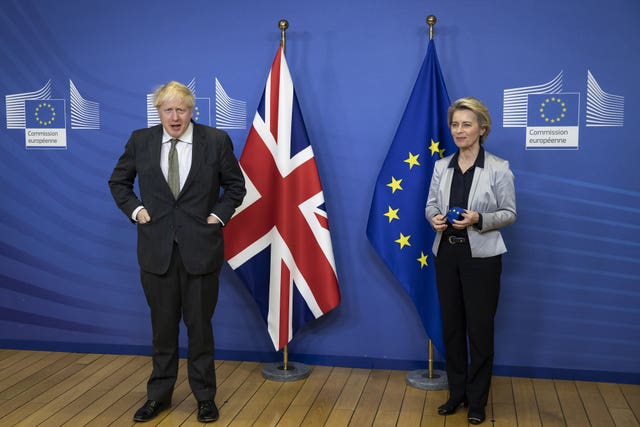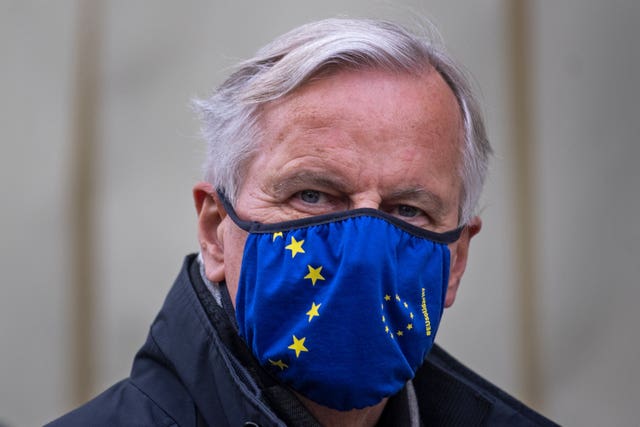EU trade deal ‘possible but far from certain’ on Wednesday – Downing St source
Talks continue between London and Brussels

It is “possible but far from certain” that a post-Brexit trade deal could be agreed with Brussels on Wednesday, a Downing Street source has said.
A Cabinet minister has also indicated that hopes are rising for securing an agreement although major differences still remain between the UK and the EU.
Negotiators are continuing to talk in Brussels while Prime Minister Boris Johnson and European Commission president Ursula von der Leyen are in close contact to try to resolve remaining difficulties.
Both sides are trying to secure a deal before the current EU withdrawal transition period ends on December 31.

As speculation mounted that a deal could be struck, the European Research Group (ERG) of hardline pro-Brexit Tory MPs said it would scrutinise any agreement in detail.
The body said it would reconvene its so-called “star chamber” to examine any deal.
A statement issued by the group on Wednesday said: “Assuming a deal between UK and the EU is officially confirmed tonight, the European Research Group will tomorrow reconvene the panel of legal experts, chaired by Sir William Cash MP, to examine the details of the deal and legal text.
“The team of highly-experienced lawyers, previously known as the ‘star chamber’, was first assembled in 2019 to examine the legal aspects of Theresa May’s original Withdrawal Agreement.
“Given that the new agreement is also highly complex, the star chamber will scrutinise it in detail, to ensure that its provisions genuinely protect the sovereignty of the United Kingdom after we exit the transition period at the end of this year.”
Earlier on Wednesday, Cabinet minister Robert Jenrick said he is “reasonably optimistic” that a late deal will be agreed before the current trading arrangements expire at the end of the month.
Mr Johnson has previously said that the most likely outcome is failure to reach a deal, with the UK then relying on World Trade Organisation (WTO) terms – meaning tariffs and quotas on trade with the EU.
Despite his upbeat assessment, Mr Jenrick told Sky News that “serious areas of disagreement” remain on fishing and the “level playing field” measures aimed at preventing unfair competition on standards and state subsidies.
“We are working through those issues, our negotiators will keep going – the Prime Minister has been very clear that he is going to negotiate until the very end, which is December 31, because that is the right thing, it is what the British public would expect.
“But at the moment there isn’t sufficient progress, it isn’t a deal that the Prime Minister feels he can sign us up to because it doesn’t yet respect us, in full, as a sovereign, independent nation.”
France warned that the EU would not be pressed into agreeing a deal just because of the looming deadline.
French Europe minister Clement Beaune said a no-deal situation would be “catastrophic” for the UK and suggested the EU should hold out.
“We should not put ourselves, Europeans, under time pressure to finish by this hour or that day. Otherwise we would put ourselves in a situation to make bad concessions.”
Ireland’s premier Micheal Martin raised the prospect of officials working on the text of a Brexit deal on Christmas Day if a breakthrough comes before then.
The Taoiseach said he and other EU leaders were on stand-by to endorse any agreement that might emerge from negotiations between Brussels and the UK Government.
“On balance, I think, given the progress that has been made, that there should be a deal,” he told RTE Radio One.
“And I think that a no deal would be an appalling shock to the economic system on top of Covid-19, which has really hit the respective of economies of the UK, Ireland and the EU member states.
“In particular, our domestic economy has taken a very big hit. And so we do need a deal.
“It’s all down to fish, it would appear right now.”
On Tuesday, the EU’s lead negotiator, Michel Barnier, said they were making a “final push” to reach a deal and it was a “crucial moment”.

Earlier, the European Parliament’s former Brexit co-ordinator, Guy Verhofstadt, said the queues of lorries in Kent are a sign of things to come.
France closed its border with the UK as a result of the new strain of coronavirus that is spreading rapidly across London and the South East.
In a tweet, Mr Verhofstadt said: “We forgot what borders look like. Some thought they would remain open with or without the EU. They will now start to understand what leaving the EU really means.”
Asked whether there is a link between French President Emmanuel Macron’s action to shut the border with France and the Brexit negotiations, Mr Jenrick said: “I hope not.”




